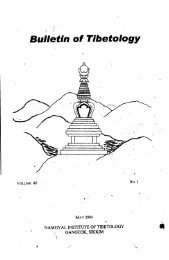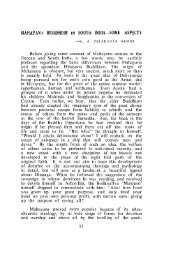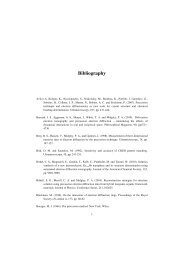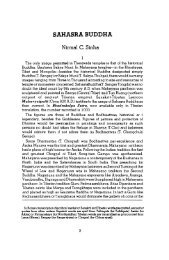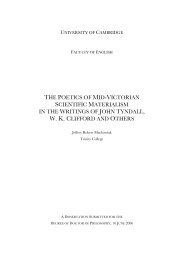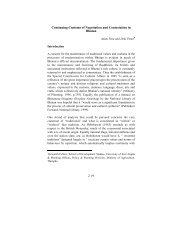The Crusades, the Genoese and the Latin East - DSpace at ...
The Crusades, the Genoese and the Latin East - DSpace at ...
The Crusades, the Genoese and the Latin East - DSpace at ...
You also want an ePaper? Increase the reach of your titles
YUMPU automatically turns print PDFs into web optimized ePapers that Google loves.
view taken by Fo<strong>the</strong>ringham in his article was primarily from <strong>the</strong> angle of <strong>the</strong> consequences in<br />
Constantinople <strong>and</strong> <strong>the</strong> diplom<strong>at</strong>ic turmoil, violence <strong>and</strong> <strong>the</strong> open conflict between Venice <strong>and</strong><br />
Genoa over <strong>the</strong> hegemony of <strong>the</strong> eastern Mediterranean. <strong>The</strong> commercial aspects were thus<br />
ignored; none<strong>the</strong>less, this study is still relevant.<br />
It is interesting to compare <strong>the</strong> events in Genoa during <strong>the</strong> prepar<strong>at</strong>ions for <strong>the</strong> Third<br />
Crusade to <strong>the</strong> situ<strong>at</strong>ion on <strong>the</strong> eve of <strong>the</strong> Fourth Crusade. <strong>The</strong>re are signs of an unequivocal shift<br />
in <strong>the</strong> city's involvement in <strong>the</strong> crusading movement. Genoa took a leading role in <strong>the</strong> Third<br />
Crusade already from <strong>the</strong> prepar<strong>at</strong>ions stage, when it had to medi<strong>at</strong>e between <strong>the</strong> kings of<br />
Engl<strong>and</strong> <strong>and</strong> France. Moreover, Genoa took part in <strong>the</strong> crusade <strong>and</strong> it also committed its fleet for<br />
<strong>the</strong> transport of o<strong>the</strong>r crusaders. As was demonstr<strong>at</strong>ed in <strong>the</strong> previous chapter, Genoa had<br />
eventually paid a high economic price as a consequence of <strong>the</strong> delay in <strong>the</strong> embark<strong>at</strong>ion on <strong>the</strong><br />
crusade. It <strong>the</strong>refore seems likely th<strong>at</strong> in <strong>the</strong> light of <strong>the</strong> effects of <strong>the</strong> Third Crusade, Genoa was<br />
not ready to take <strong>the</strong> risk of committing its fleet to ano<strong>the</strong>r crusade.<br />
Presumably, <strong>the</strong> annals reflected <strong>the</strong> general <strong>at</strong>titude of <strong>the</strong> <strong>Genoese</strong> public; thus <strong>the</strong> fact<br />
th<strong>at</strong> <strong>the</strong>re were no records of <strong>the</strong> call for <strong>the</strong> crusade in 1198 suggests th<strong>at</strong> <strong>the</strong> issue was not<br />
highly important to <strong>the</strong> <strong>Genoese</strong>. Intern<strong>at</strong>ional affairs closer to home, <strong>the</strong> conflict with Pisa <strong>and</strong><br />
<strong>the</strong> question of Sicily, were more immedi<strong>at</strong>e. <strong>The</strong> first time <strong>the</strong> annalist Ogerio Pane mentioned<br />
events rel<strong>at</strong>ed to <strong>the</strong> prepar<strong>at</strong>ions for <strong>the</strong> crusade was in 1202. Ogerio Pane described <strong>the</strong> efforts<br />
of <strong>the</strong> Marquis Boniface of Montferr<strong>at</strong> to bring peace between Pisa <strong>and</strong> Genoa. However, he did<br />
not spell out <strong>the</strong> urgency of <strong>the</strong> pact or <strong>the</strong> grounds for <strong>the</strong> intern<strong>at</strong>ional interest in ending a local<br />
war. 164<br />
Ogerio's focal point throughout this time had been <strong>the</strong> self-interest of Genoa, particularly<br />
with regard to <strong>the</strong> conflict with Pisa. Fur<strong>the</strong>rmore, <strong>the</strong> lack of diplom<strong>at</strong>ic efforts to maintain <strong>the</strong><br />
peace after <strong>the</strong> imposed truce was signed, led almost immedi<strong>at</strong>ely to renewed conflict. It seems<br />
clear th<strong>at</strong> Genoa <strong>and</strong> Pisa did not make serious efforts to bring <strong>the</strong> war to a true end or even to<br />
suspend <strong>the</strong> conflict for a certain period for <strong>the</strong> sake of <strong>the</strong> crusade. Considering this <strong>at</strong>titude,<br />
almost ironic th<strong>at</strong> Villehardouin wrote in his chronicle th<strong>at</strong> <strong>the</strong> leaders of <strong>the</strong> crusade preferred to<br />
embark from Venice because <strong>the</strong>re were more ships available <strong>the</strong>re. 16S Furhtermore, this<br />
st<strong>at</strong>ement st<strong>and</strong>s out in contradiction to Robert de Clari's descriptions of <strong>the</strong> events, according to<br />
which Genoa <strong>and</strong> Pisa were indeed approached first but declined <strong>the</strong> crusaders' offer. 166<br />
Queller<br />
wrote about <strong>the</strong> difference between <strong>the</strong>se two account th<strong>at</strong> Robert de Clari `cannot be relied upon<br />
for details before his own arrival in Venice', however, <strong>the</strong> following analysis will show th<strong>at</strong><br />
164<br />
Ann. Ian., vol. 2, p. 83.<br />
163<br />
Villehardouin, vol. 1, p. 19.<br />
166<br />
Robert de Clari, ch. 6, p. 8.<br />
57<br />
it is





